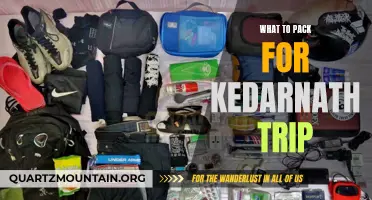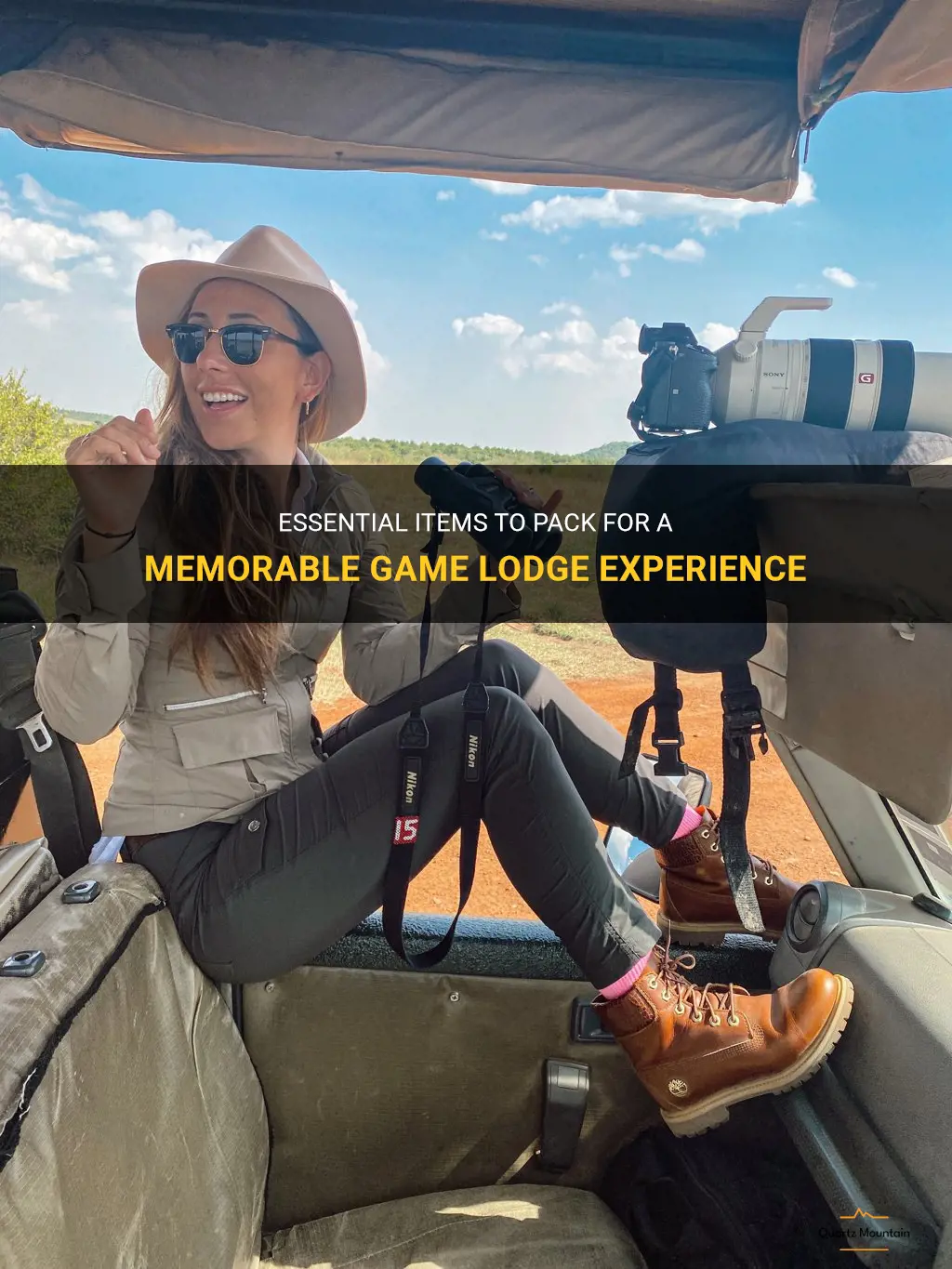
Planning a game lodge experience is a thrilling adventure in itself, where we prepare to immerse ourselves in the extraordinary beauty of nature and embark on unforgettable encounters with wildlife. However, to ensure a seamless and unforgettable adventure, it is essential to pack the right items that will enhance our comfort, convenience, and overall enjoyment. From practical essentials like bug spray and comfortable clothing to exciting extras like binoculars and a good camera, the right gear can truly make all the difference in creating a memorable game lodge experience. So, before you embark on your next safari adventure, make sure to pack these essential items to guarantee an adventure of a lifetime.
What You'll Learn
- What essential clothing items should I pack for a game lodge?
- Are there any specific toiletries or personal care items I should bring to a game lodge?
- Should I pack any specific accessories or gear for activities on a game lodge, such as binoculars or a camera?
- Are there any recommended guidelines for footwear to pack for a game lodge?
- Are there any specific items or equipment I should bring for safaris or wildlife viewing at a game lodge?

What essential clothing items should I pack for a game lodge?
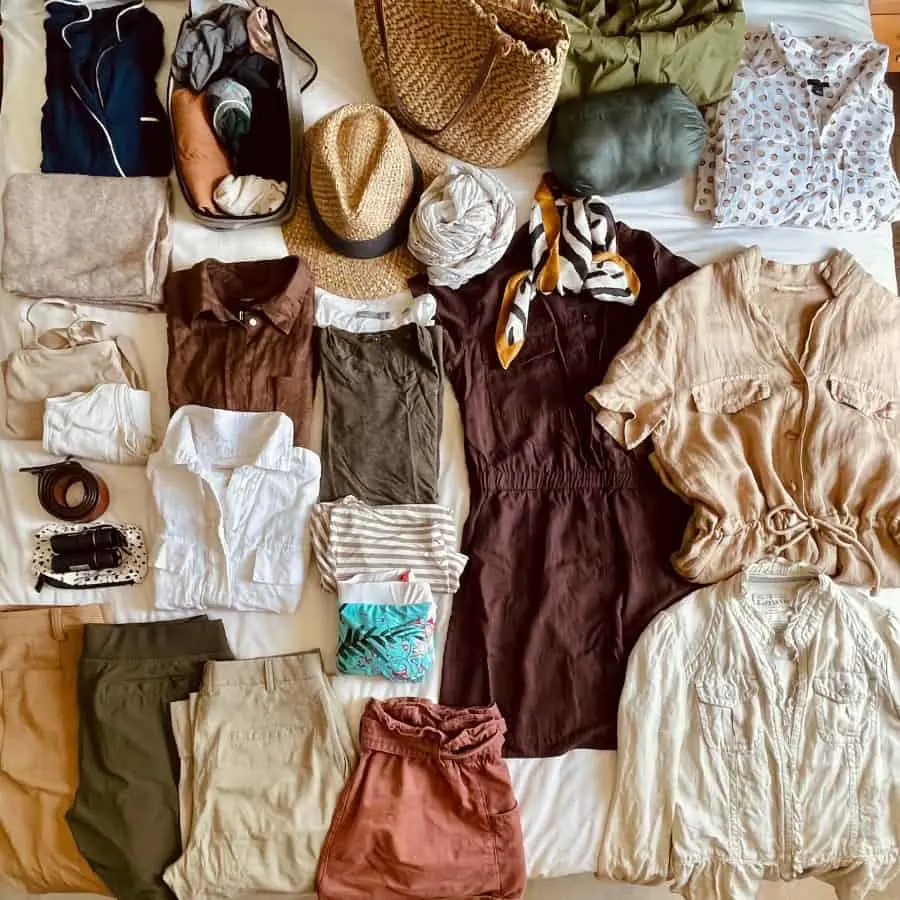
When packing for a game lodge, it is important to consider the specific needs and requirements of your trip. The clothing items you bring should provide comfort, protection, and functionality in the African bushveld environment. Here are a few essential clothing items that you should include in your packing list:
- Comfortable and lightweight clothing: Opt for clothing made from breathable materials such as cotton or linen. Loose-fitting shirts and pants are ideal for hot weather, as they allow air circulation and help to regulate body temperature.
- Long-sleeved shirts and pants: In addition to lightweight clothing, it is essential to pack long-sleeved shirts and pants to protect yourself from the sun, insects, and thorny vegetation. Look for clothing with UPF (ultraviolet protection factor) ratings for added sun protection.
- Sturdy closed-toe shoes: A pair of sturdy closed-toe shoes, such as hiking boots or sneakers, are essential for walking safaris and game drives. Your shoes should have a good grip and provide ankle support to navigate through uneven terrain.
- Hat and sunglasses: Protecting your head and eyes from the sun is crucial. Pack a wide-brimmed hat that provides shade for your face, neck, and ears. Additionally, bring a pair of sunglasses with UV protection to shield your eyes from the sun's harmful rays.
- Rain jacket or poncho: While a rain jacket or poncho may not be needed year-round, it is always wise to be prepared for unexpected rainfall. Choose a lightweight and waterproof jacket or poncho that can easily be packed.
- Swimsuit: Many game lodges have swimming pools or offer access to nearby water bodies, providing an opportunity for a refreshing swim. Don't forget to pack a swimsuit if you plan to take advantage of these amenities.
- Warm layers: Depending on the time of year and your destination, the nights and early mornings can be chilly. Pack some warm layers, such as a fleece jacket or sweater, to stay comfortable during cooler temperatures.
- Neutral-colored clothing: To blend in with the natural surroundings and avoid disturbing wildlife, it is advisable to pack clothing in neutral colors, such as khaki, beige, or olive green. Bright colors may attract unwanted attention from insects or scare off animals.
- Socks and underwear: Don't forget to pack enough pairs of socks and underwear for the duration of your trip. Opt for moisture-wicking socks to keep your feet dry and minimize the risk of blisters.
- Insect repellent clothing: Consider purchasing clothing treated with insect repellent or bringing your own insect repellent spray or lotion. This can help protect you from mosquito bites and other insects.
Remember to check the weather forecast for your specific destination and time of travel. This will help you further refine your packing list and ensure you are adequately prepared for the conditions you may encounter. By packing the right clothing items, you will be able to enjoy your game lodge experience comfortably and safely, while immersing yourself in the stunning African wilderness.
Essential Items to Pack for a Trip to Stockholm
You may want to see also

Are there any specific toiletries or personal care items I should bring to a game lodge?
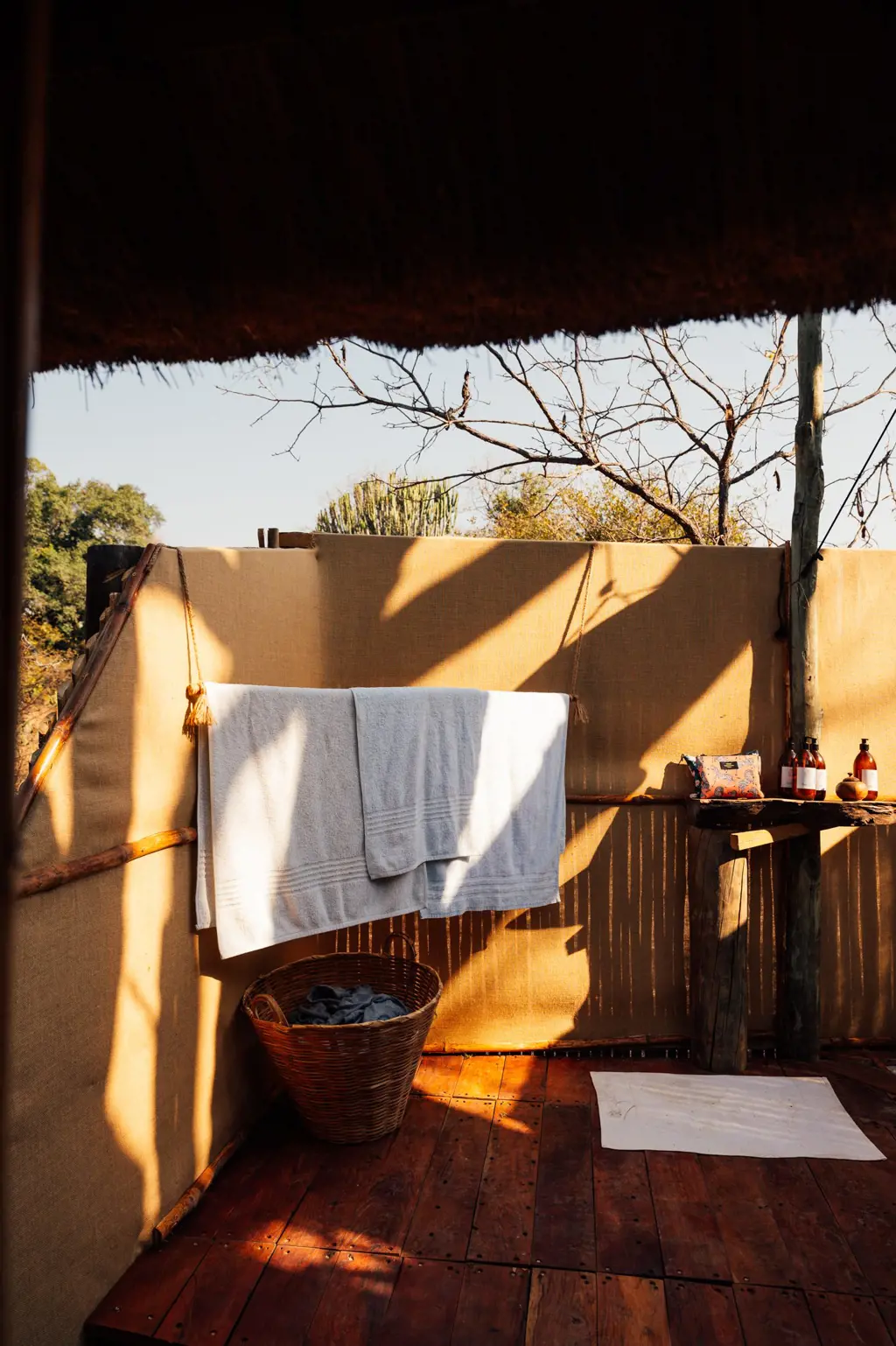
Are there any specific toiletries or personal care items you should bring to a game lodge? The answer is, it depends on the lodge and its amenities, but there are some common items that are generally recommended for a comfortable and enjoyable stay. Here are some suggestions:
- Sunscreen: Game lodges are typically located in sunny and open areas, so it's important to protect your skin from the harmful effects of the sun. Make sure to bring a high SPF sunscreen and apply it regularly, especially if you plan on spending a lot of time outdoors.
- Insect repellent: Game lodges are often located in areas with a high mosquito population, so it's a good idea to bring some insect repellent to protect yourself from bug bites. Look for a repellent with DEET, as it is proven to be the most effective at keeping mosquitoes away.
- Hat and sunglasses: The African sun can be quite intense, so it's important to protect your eyes and face from the sun's rays. Bring a wide-brimmed hat and a pair of sunglasses with UV protection to keep your eyes and skin safe.
- Toiletries: While most game lodges provide basic toiletries such as soap and shampoo, it's always a good idea to bring your own. Some lodges may not provide items like toothpaste, toothbrushes, or razors, so be sure to pack those as well.
- Medications: If you take any regular medications, make sure to bring an ample supply for the duration of your stay. It's also a good idea to pack a basic first aid kit with essentials like band-aids, antiseptic cream, and pain relievers.
- Comfortable clothing and shoes: Game drives and outdoor activities can be physically demanding, so it's important to dress comfortably. Pack lightweight, breathable clothing that will keep you cool during the day and warm at night. Also, don't forget to bring a sturdy pair of walking shoes or hiking boots for exploring the lodge's surroundings.
- Camera: Game lodges offer unique opportunities to see and capture wildlife up close, so don't forget to bring a camera or a smartphone with a good camera. You'll want to document your memories and share them with friends and family.
It's always a good idea to check with the specific game lodge you'll be staying at to see if they have any specific recommendations or requirements. Some lodges may provide certain toiletries or personal care items, while others may not. By being prepared and packing the essential items, you'll ensure a comfortable and enjoyable stay at a game lodge.
Essential Items to Pack in Your Lunch Box for a Nutritious and Delicious Meal
You may want to see also

Should I pack any specific accessories or gear for activities on a game lodge, such as binoculars or a camera?
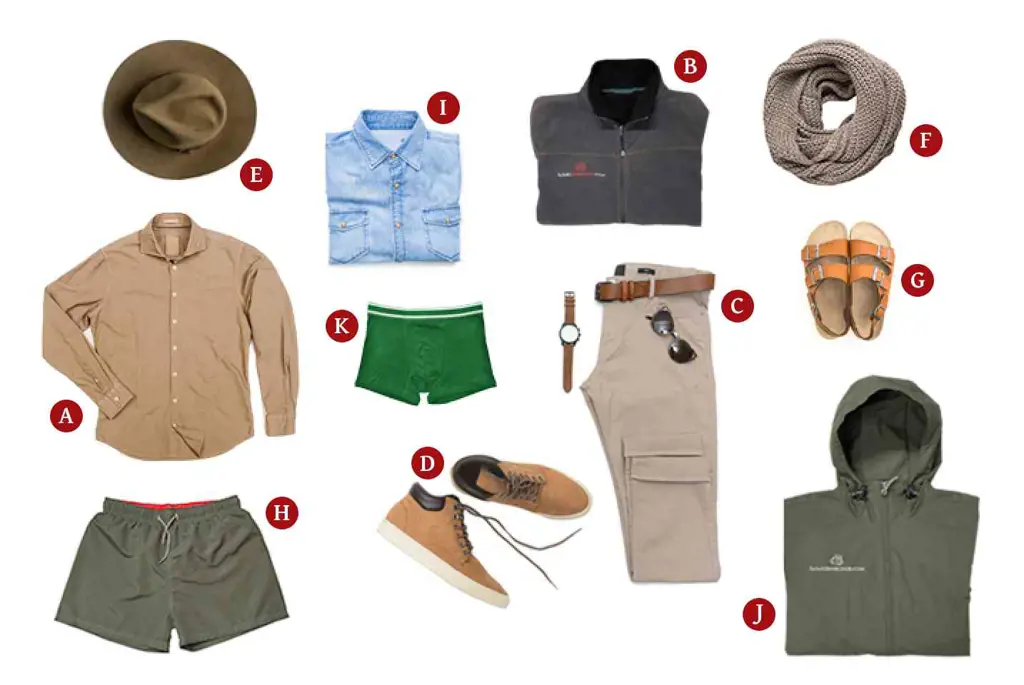
When planning a trip to a game lodge, it is important to consider what specific accessories or gear you should pack for activities such as wildlife viewing, birdwatching, and taking photographs. While some lodges may provide equipment, it is always best to come prepared with your own gear to enhance your experience. Here are some essential accessories and gear you should consider packing for activities on a game lodge:
- Binoculars: Binoculars are a must-have accessory for wildlife viewing in a game lodge. They allow you to observe animals from a distance without disturbing them. Look for binoculars with a magnification of at least 8x and a wide field of view for better visibility. Additionally, opt for lightweight and compact binoculars that are easy to carry around during game drives or walks.
- Camera: A good quality camera is essential for capturing the stunning landscapes and wildlife sightings in a game lodge. A DSLR camera with a telephoto lens will allow you to capture detailed images of animals from a distance. It is also worth investing in a tripod to stabilize your camera during long exposures or when using a heavy telephoto lens. If you don't have a DSLR, a high-resolution point-and-shoot camera or even a smartphone with a good camera can still yield impressive results.
- Wildlife Field Guide: A wildlife field guide is a valuable resource for identifying different animal species and learning more about their behavior. There are many comprehensive field guides available that cover the wildlife specific to the region you are visiting. Look for guides with clear photographs, detailed descriptions, and information on habitat and distribution of each species.
- Safari Clothing: While not strictly an accessory or gear, the right clothing can greatly enhance your comfort during game drives and walks. Opt for lightweight, breathable clothing in neutral colors such as khaki, beige, or olive green to blend in with the surroundings. Additionally, pack a hat, sunscreen, sunglasses, and insect repellent to protect yourself from the sun and bugs.
- Field Notebook: A small notebook and pen are handy for jotting down observations, sketching wildlife, or keeping a journal of your experiences in the game lodge. This can be a great way to document your sightings, record interesting behaviors, or simply reflect on your time in the wilderness.
- Field Guides and Reference Books: If you have a particular interest in birds, mammals, or plants, consider packing a specialized field guide or reference book. These resources can provide more in-depth information and help you identify and understand the flora and fauna you encounter during your stay.
- Portable Power Bank: With the increased use of smartphones and cameras, it is essential to have a portable power bank to keep your devices charged during long game drives or walks. This ensures that you won't miss out on capturing any memorable moments due to a dead battery.
Remember to pack all these accessories and gear in a sturdy bag or backpack that is comfortable to carry during game drives or walks. Additionally, check with the game lodge you are visiting to see if they have any specific recommendations or requirements for equipment.
In conclusion, packing specific accessories and gear for activities on a game lodge can greatly enhance your experience and allow you to fully immerse yourself in the wilderness. Binoculars, a camera, a wildlife field guide, safari clothing, a field notebook, field guides and reference books, and a portable power bank are all essential items to consider when planning your trip. With the right gear, you'll be ready to capture incredible wildlife sightings and create lasting memories in the game lodge.
The Essential Checklist for Packing for Your Dive Trip
You may want to see also

Are there any recommended guidelines for footwear to pack for a game lodge?
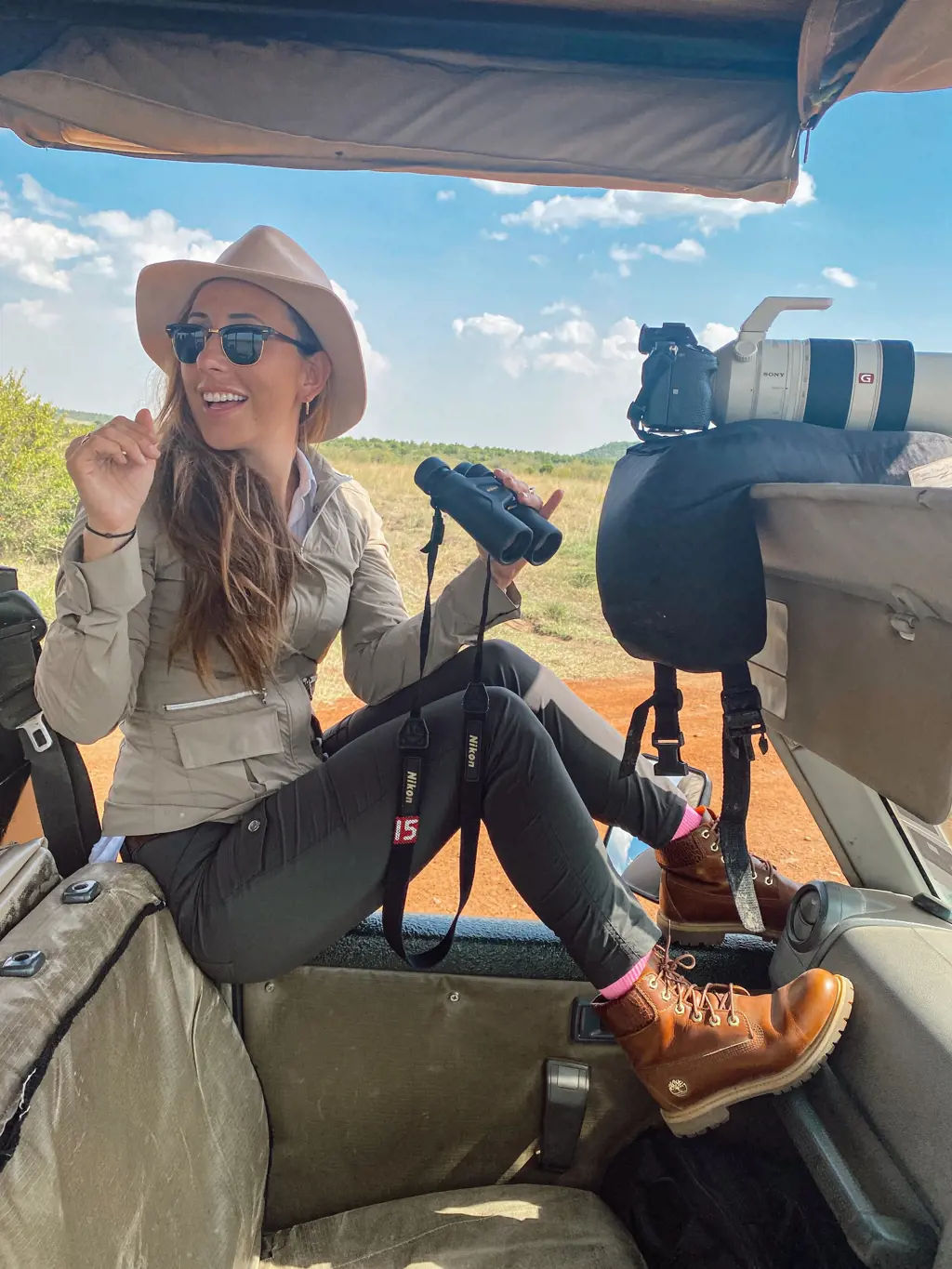
When packing for a game lodge, it is essential to consider the specific activities and terrain you will encounter during your stay. One crucial aspect of your packing list should be the footwear you choose to bring. The right footwear can make a significant difference in your comfort and enjoyment during game drives and other lodge activities. In this guide, we will provide you with some recommended guidelines for footwear to pack for a game lodge.
Comfort is Key:
When it comes to selecting footwear for a game lodge, comfort should be your top priority. Game drives often require you to spend hours in a vehicle, and walking activities may involve rough and uneven terrains. Therefore, choose comfortable footwear that provides adequate cushioning and support for your feet.
Closed-Toe Shoes:
It is essential to pack closed-toe shoes for your game lodge adventure. Closed-toe shoes offer better protection against insects, thorny bushes, and potential injuries from uneven terrain. These shoes can be a pair of sturdy walking shoes or lightweight hiking boots -- whatever is most comfortable for you.
Breathable, Lightweight Shoes:
The game lodge environment can be hot and humid, especially during summer months. Therefore, it is advised to choose footwear made from breathable materials that allow air circulation to keep your feet cool and dry. Lightweight shoes will also prevent your feet from feeling fatigued during long walks or hikes.
Slip-On shoes:
Having a pair of slip-on shoes, such as sandals or loafers, can come in handy during your lodge stay. These shoes are perfect for relaxing at the lodge, taking short walks around the camp, or simply slipping on and off easily when you’re getting in and out of the safari vehicle.
Waterproof Shoes:
Depending on the season and destination, you may encounter muddy or wet terrain during your game drives or bushwalks. Waterproof shoes or shoes with waterproofing treatments can protect your feet from getting wet and keep them comfortable throughout your activities.
Socks:
Don't forget to bring enough pairs of socks to wear with your footwear. Opt for moisture-wicking socks that will keep your feet dry and prevent blisters. Additionally, consider packing a few pairs of thicker socks to keep your feet warm during early morning or late evening drives when the temperatures may be cooler.
Extra Shoes:
It's always a good idea to have a backup pair of shoes. Accidents can happen, and having an extra pair can save you from discomfort if your primary footwear gets damaged or wet.
In summary, when packing for a game lodge, choose footwear that is comfortable, closed-toe, breathable, lightweight, slip-on, and waterproof. Don't forget to bring the appropriate socks and a backup pair of shoes. By following these guidelines, you will ensure that your feet remain comfortable and protected during your game lodge adventure.
Essential Items for Your Earthquake Preparedness Kit
You may want to see also

Are there any specific items or equipment I should bring for safaris or wildlife viewing at a game lodge?
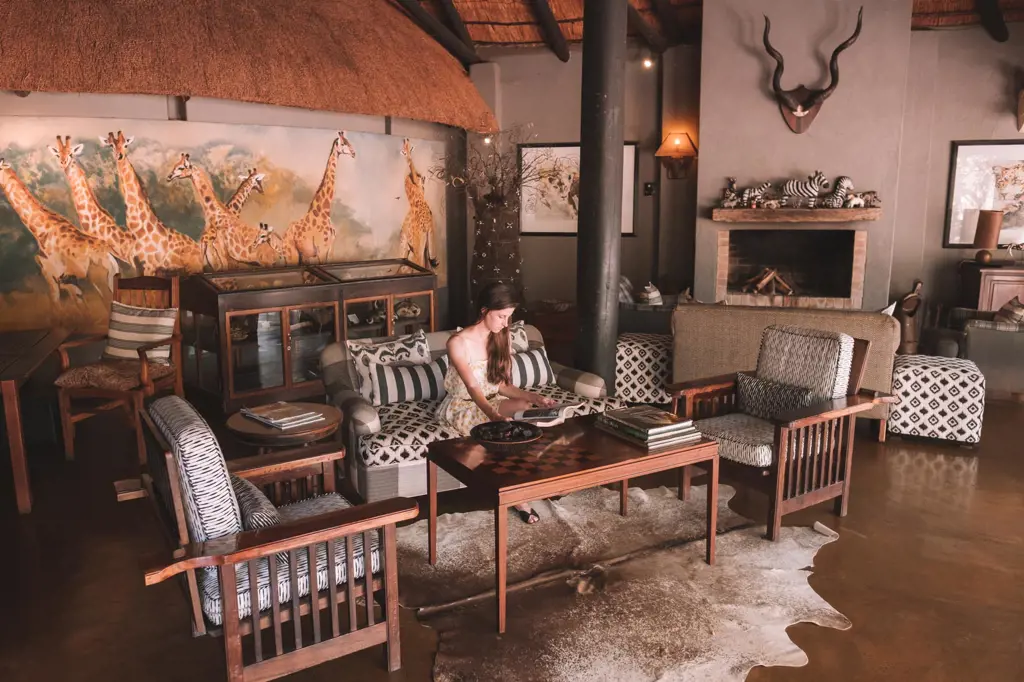
When going on a safari or wildlife viewing adventure at a game lodge, it is essential to bring certain items and equipment to ensure a safe and enjoyable experience. Whether you are embarking on a guided tour or exploring the wilderness on your own, the right gear can enhance your ability to observe wildlife safely and comfortably. Here are some specific items you should consider bringing for your safari or game lodge adventure:
- Binoculars: A good pair of binoculars is a must-have for wildlife viewing. It allows you to get a closer look at animals without disturbing them and enhances the overall experience. Look for binoculars with good magnification and image stabilization for clearer and steadier viewing.
- Camera and Zoom Lens: Capture the incredible moments and wildlife encounters by bringing a camera with a zoom lens. This will allow you to take detailed photos of animals from a safe distance without intruding on their space. Make sure to pack extra batteries and memory cards as well.
- Sun Protection: Safaris often take place in sunny and hot environments, so it is crucial to protect yourself from the sun. Bring a wide-brimmed hat, sunglasses, and sunscreen with a high SPF to shield yourself from harmful UV rays.
- Insect Repellent: Mosquitoes and other bugs can be a nuisance during safaris. Pack a good quality insect repellent to protect yourself from bites and diseases. Look for one that is effective against a wide range of insects and reapply it frequently, especially during dawn and dusk when mosquitoes are most active.
- Comfortable Clothing: Opt for lightweight, breathable clothing in neutral colors to blend in with the natural surroundings. Long-sleeved shirts and pants offer added protection against the sun and insects. Avoid bright colors and patterns that may scare away wildlife.
- Sturdy Walking Shoes: A pair of sturdy walking shoes is essential for safaris as you may be walking or hiking on uneven terrain. Choose footwear with good ankle support and a sole that provides traction on different surfaces.
- Water Bottle and Snacks: Staying hydrated is crucial during safaris, especially in hot climates. Bring a refillable water bottle and pack some energy snacks to keep yourself nourished throughout the day. Avoid disposable plastic bottles to minimize waste and consider bringing a water purification system if clean water may not be readily available.
- First Aid Kit: It is always wise to have a basic first aid kit on hand for any unexpected injuries or illnesses. Pack essentials like band-aids, antiseptic cream, pain relievers, and any necessary prescription medications.
- Field Guide or Wildlife Reference Book: Enhance your wildlife knowledge and identification skills by bringing along a field guide or wildlife reference book. This can help you identify different animal species and learn more about their behaviors and habitats.
- Respectful Behavior: While not an item or equipment, it is crucial to bring a sense of respect and understanding for the wildlife and their environment. Maintain a safe distance from animals, adhere to park regulations, and do not disturb or feed the wildlife. Remember that you are a guest in their natural habitat.
By packing these essential items and equipment, you will be well-prepared for your safari or game lodge adventure. Remember to check with your safari guide or lodge for any specific recommendations or requirements based on the location and time of year. Make sure to respect the wildlife and their environment, and enjoy the incredible experience of observing animals in their natural habitat.
Essential Items to Pack for a Meaningful Mission Trip
You may want to see also
Frequently asked questions
When packing for a game lodge, it is important to consider the activities and climate of the location. Some general items to pack include comfortable and durable clothing, closed-toe shoes, sunscreen, insect repellent, and a hat. Additionally, don't forget to pack any necessary medications, toiletries, and a first aid kit.
Many game lodges provide guests with safari gear, such as binoculars, rain ponchos, and backpacks. However, it is always best to check with your specific lodge to see what they provide and what you may need to bring. If you have your own gear and prefer to use it, feel free to bring it along.
Most game lodges have a relaxed dress code, with a focus on comfort and practicality. It is recommended to pack neutral, earth-toned clothing that blends in with the surroundings. Avoid bright colors that could potentially scare off wildlife. Also, keep in mind that some lodges may have specific dress code requirements for dinner or other formal events, so it's best to check with the lodge ahead of time.
For game drives, it is recommended to bring a camera or binoculars to fully enjoy the wildlife viewing opportunities. It's also a good idea to bring a jacket or sweater for early morning or evening drives when temperatures can be cooler. Additionally, bring a small daypack to carry essentials like sunscreen, insect repellent, water, and snacks. Lastly, don't forget to pack a sense of adventure and an open mind to fully embrace the experience!







